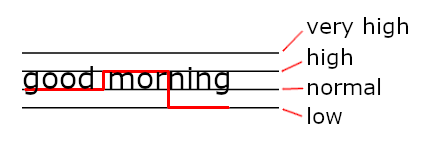In today’s lesson we will learn about intonation.
Imitation
This story is similar to the homework from the last lesson but a little different. Imitate the story by parroting the storyteller. Repeat about one second after her. Alternatively, pause the video after every phrase. Pay attention to the blended words.
Homework answers
Here are the homework answers from the last class.
ðə ˈlɪɾəl ˈrɛd‿ˈhɛn
ðə ˈlɪɾəl ˈrɛd‿ˈhɛn wəz ˈɑn ðə ˈfɑrm ˈwɪθ hɚ ˈbeɪbi ˈʧɪkənz
ʃi ˈfaʊnd səm ˈwit
ˈhu wɪl ˈhɛlp‿mi ˈplænt‿ðɪs ˈwit ʃi ˈsɛd
ˈnɑʔ ˈmi ˈsɛd‿ðə ˈgus
ˈnɑʔ ˈmi ˈsɛd‿ðə ˈdʌk
ˈaɪ wɪl ˈdu‿ɪt maɪˈsɛlf ðɛn ˈsɛd‿ðə ˈlɪɾəl ˈrɛd‿ˈhɛn
ɛn ʃi ˈplæntəd‿ðə ˈwit
wɛn ðə ˈwit wəz ˈrɛdi ʃi ˈsɛd
ˈhu wɪl ˈhɛlp mi ˈmeɪk‿ðɪs ˈwit‿ɪntu ˈflaʊɚ
ˈnɑt ˈmi ˈsɛd‿ðə ˈgus
ˈnɑt ˈmi ˈsɛd‿ðə ˈdʌk
ˈaɪ wɪl ˈdu‿ɪt maɪˈsɛlf ðɛn ˈsɛd‿ðə ˈlɪɾəl ˈrɛd‿ˈhɛn
ɛn ʃi ˈmeɪd‿ðə ˈwit‿ɪntə ˈflaʊɚ
wɛn ʃi ˈbrɑʔ‿ðə ˈflaʊɚ ˈhoʊm ʃi ˈsɛd
ˈhu wɪl ˈhɛlp‿mi ˈmeɪk səm ˈbrɛd wɪð‿ðɪs ˈflaʊɚ
ˈnɑʔ ˈmi ˈsɛd‿ðə ˈgus
ˈnɑʔ ˈmi ˈsɛd‿ðə ˈdʌk
ˈaɪ wɪl ˈdu‿ɪt maɪˈsɛlf ðɛn ˈsɛd‿ðə ˈlɪɾəl ˈrɛd‿ˈhɛn
wɛn ðə ˈbrɛd wəz ˈrɛdi ʃi ˈsɛd
ˈhu wɪl ˈhɛlp‿mi ˈiʔ‿ðɪs ˈbrɛd
ˈaɪ ˈwɪl ˈsɛd‿ðə ˈgus
ˈaɪ ˈwɪl ˈsɛd‿ðə ˈdʌk
ˈnoʊ ˈju ˈwoʊnt ˈsɛd‿ðə ˈlɪɾəl ˈrɛd‿ˈhɛn
ˈaɪ wɪl‿ˈiɾ‿ɪt maɪˈsɛlf
ɛn ʃi ˈkɑld hɚ ˈlɪɾəl ˈʧɪkənz tə ˈhɛlp hɚ
Some of these could be disputed or there are alternate forms that are equally valid. If you have a question, leave a comment below.
Review
IPA Reading
Read the names of these countries
- ɑrˈminiə
- bəlˈgɛriə
- ˈsɑɪprəs
- ɛlˈsælvədɔr
- ˈkɑzəkstɑn
- ˈlɪktənstɑɪn
- ˌmɑɪkrəˈniʒə
- ˌnɪkəˈrɑgwə
- roˈmeɪniə
- siˌɛrə leɪˈoʊn
- suˈdæn
- juˈgɑndə
- ˌviətˈnɑm
Sentence Stress and Word Blending
Mark the probable stressed words and word blending in these sentences according to the rules:
It’s nice to meet you.
My name is Mary.
I’d like to introduce you to my friend.
Don’t you work at the bank?
Please tell him that I’m thinking of him.
Jeremy Lin is a famous sports star.
Would you be willing to go out with her?
What do you want to know?
That’s too bad.
What did you do next?
Would you mind turning down the volume on your radio?
Please get a loaf of bread and a dozen eggs at the supermarket.
That was a great birthday party.
It isn’t too heavy?
I come from Inner Mongolia.
Intonation
We are starting a big new part of the pronunciation class in this lesson, though we have been working on it all along with the imitation practice.
Intonation is where your voice goes up and down. Some intonation expresses feeling but a lot of it expresses meaning and grammar. There are many common intonation patterns in American English. If you master them you will improve your pronunciation a great deal.
Even babies learn intonation.
Even though they aren’t saying real words, you can hear their voices going up and down.
Examples
Listen to how my voice rises and falls in the following examples of intonation:
- Look at that!
- I don’t know.
- Where are you going?
- Would you like some?
- Huh?
- Uh-huh
- Huh-uh
British vs American English Intonation
British and American English don’t use the same intonation patters. You can hear this in the following dialog from the British Council:
A: Hi! I’m Hong Lei. What’s your name?
B: Hello, Hong Lei. My name’s Ricky.
A: Hi Ricky. Are you a new student here?
B: Yes, I had my first lesson this morning. Are you a new student too?
A: No, I’ve been here for six months.
B: Six months. That’s a long time.
A: It’s not so long really. What class are you in? Intermediate or …?
B: Intermediate Three. And what about you?
A: I’m in Advanced One. Who’s your teacher?
B: I can’t remember her name, but she’s got curly red hair.
A: Ah! Does she wear glasses?
B: Yes, I think so.
A: That’s probably Anne Wallis.
B: Yes that’s right. Do you know her? Is she your teacher too?
A: No. But she taught me last term. How long have you been here?
B: Only a week.
A: Wow, not long. Where do you live? With a family?
B: Well, I’m staying at the YMCA at the moment. I’m looking for somewhere more permanent. Do you know of any good places?
A: Yes. Actually my friend has a spare room in here apartment and she’s looking for a flatmate. Would you like her phone number?
B: That would be great! Thanks for your help. Can I buy you coffee?
Here it is again with spacing where I will give the American version of the intonation pattern.
American English intonation
In this course we are just focusing on American English intonation.
Tones
English is not usually known as a tonal language like some languages in the world. However, we actually do use tones to change the meaning of words and sentences.
Examples
- That’s great.
- What are you doing here?
Tones are like music.

Let’s put “Good morning” on there as if it were music.

If we had to write music every time that we wanted to express intonation, though, it would be a lot of trouble. Instead, you can draw lines to indicate the tone.

There are four basic tones in English:
- Very high
- High
- Normal
- Low
A line directly below the word means Normal. This is your normal voice level. A line directly above the word means high. And a line well below the word means low. Occasionally there are very high tones in English and you can indicate these by drawing a line well above the word.
In the rest of the lessons I’ll typically connect these horizontal lines like this, but the meaning is the same:


Tell me what the tones are for these sentences are as I read them:
- I know more about it that he does.
- It’s so far.
Here is some more practice:
- What time is it?
- How are you?
- I’m going to the store now.
Quiz
Mark stressed words with ˈ and word blending with ‿
Just use the stress rules and blending rules that I taught in class.
Does she like it?
My father is in the front of the line.
Tomorrow is my birthday.
The sun is really hot at noon but not in the evening.
Call Frank as soon as you come back.
She looked thoughtfully at the painting hanging on the wall.
Will these clothes fit in this suitcase?
Why is the sky so dark at night?
He’s not a patient man so be sure to come on time.
When I was thirsty, Bob is the man who gave me a drink.
What do you like to do in your free time?
Everyone needs to improve their language skills.
I love to talk in English.
The young man gave up his seat on the bus for the old woman.
It IS going to snow this winter, isn’t it?
